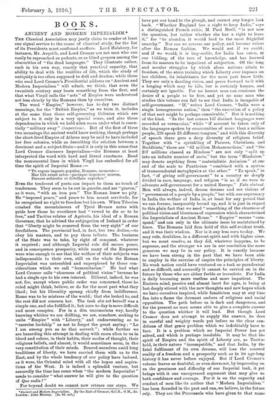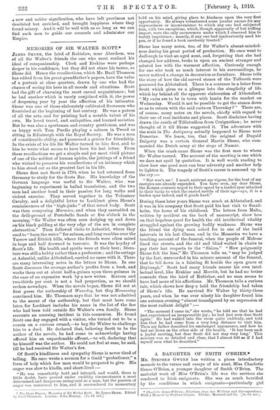BOOKS.
ANCIENT AND MODERN IMPERIALISM.* THE Classical Association may justly claim to render at least one signal service to the cause of classical study, for the list of its Presidents must confound scoffers. Lord Halsbury, for instance, Mr. Asquith, and Lord Cromer are not men who can easily be reproached as pedants, or as blind gropers among the obscurities of "the dead languages." They illustrate rather, each in his own way, exactly that practical capacity, that ability to deal with the realities of life, which the study of antiquity is too often supposed to dull and deaden; while those who read Lord Cromer's Presidential address on "Ancient and Modern Imperialism" will admit, we think, that even the twentieth century may learn something from the first, and that what Virgil calls the " arts " of Empire were understood not less clearly by the Romans than by ourselves.
The word "Empire," however, has to-day two distinct meanings, for the "British Empire," as we term it, includes at the same time those self-governing Colonies which are subject to it only in a very special sense, and also those dependencies in which we hold alien races under what is essen- tially "military sway" (imperium). But of the first of these two meanings the ancient world knew nothing, though perhaps the short-lived Empire of Athens may be said to have included her free colonies, while as describing the relation between a dominant and a subject State—and it is only in this sense that Lord Cromer discusses Imperialism—the Romans at least interpreted the word with hard and literal exactness. Read the monumental lines in which Virgil has embodied for all time the spirit of Imperial Rome :—
"Tn regere imperio populos, Romane, memento- Hae tibi erunt artes—pacisque imponere morem, Pareere subiectis et debellare superbos."
Even the tenderest of poets can impart to them no touch of tenderness. They seem to be cut in granite, and are "graven," as it were, "with an iron pen." The Roman knew no pity. He "imposed peace," and peace to him meant servitude, for he recognised no right to freedom but his own. When Tiberius crushed the mountaineers of Tyrol Horace notes with pride how those he overthrew had "vowed to die or to be free," and Tacitus relates of Agricola, his ideal of a Roman Governor, that he advised the subjugation of Ireland in order that "liberty might be removed from the very sight" of our forefathers. The provincial had, in fact, but two duties,—to obey his masters, and to pay them tribute. The business of the State was to take, by right of conquest, whatever it required ; and although Imperial rule did secure peace, and in consequence prosperity, while many of the Emperors were wise enough to see that the welfare of their subjects was indispensable to their own, still on the whole the Roman Imperialist was untroubled and rinperplexed by those con- siderations which we call "humanitarian." He had what Lord Cromer calls "clearness of political vision" because he had a single eye to his own interest. Illiberal, indeed, he was not, for, except where public order was concerned, those he ruled might think, believe, or do for the most part what they liked; but his liberality sprang chiefly from indifference. Rome was to be mistress of the world ; that she looked to, and the rest did not concern her. The task she set herself was a simple one, and she fnlfilled it; but ours to-day is more difficult and more complex. For in a dim unconscious way, hardly knowing whither we are drifting, we are, somehow, seeking to unite "Empire" with "Liberty," and endeavouring so to "exercise lordship" as not to forget the great saying : "Lo I am among you as he that serveth "; while further we are hazarding this attempt in dealing with races alien to us in blood and colour, in their habits, their modes of thought, their religious beliefs, and almost, it would sometimes seem, in the very constitution of their minds. Reared ourselves amid long traditions of liberty, we have carried them with us to the East, and by the whole tendency of our policy have imbued, as it were, the Oriental mind with all the hopes and aspira- tions of the West. It is indeed a splendid venture, but assuredly the time has come when "the modern Imperialist" needs to consider "what answer he will give to the question of Quo vadis?"
For beyond doubt we cannot now retrace our steps. We
*Ancient and Modern Imperialism. By the Earl of Cromer, G.C.B., &e. London: John Murray. [2s. 6d. net.] have put our hand to the plough, and cannot any longer look back. "Whether England has a right to keep India," says a distinguished French critic, M. Paul Boell, "is not now the question, but rather whether she has a right to leave it," for "to abandon it would lead to the most frightful anarchy." Nor can we reverse our policy, and become rulers after the Roman fashion. We would not if we could ; and if we would, it is impossible, for India has eaten, 4 our bidding, of the tree of knowledge, and has learned from its masters to be impatient of subjection. Of the long and secular struggles by which alone nations attain to freedom, of the stern training which Liberty ever imposes on her children, its inhabitants for the most part know little. They see only a dazzling vision, and press forward to it with a longing which may be idle, but is certainly human, and certainly not ignoble. For no honest man can condemn the desire of a people to be free, and yet no sane man who studies this volume can fail to see that India is incapable of self-government. "If," writes Lord Cromer, "India were a single homogeneous nation," then "the execution of a policy of that sort might be perhaps conceivable." But it is nothing of the kind. "In the last census 147 distinct languages were recorded as vernacular," while "if account be taken only of the languages spoken by communities of more than a million people, 276 speak 23 different tongues," and with this diversity of speech there goes a deep diversity of religious belief. Together with "a sprinkling of Pamees, Christians, and Buddhists," there are "62 million Mohammedans," and "the 207 millions classed as Hindoos " are not only "split up into an infinite number of sects," but the term "Hinduism" may denote anything from "materialistic Animism" at one end of the scale to Pantheism "combined with a system of transcendental metaphysics at the other." "To speak," in fact, "of giving self-government" to a country so deeply divided in race, language, and religion "is as if we were to advocate self-government for a united Europe." _Pala obstant. Men will always, indeed, dream dreams and see visions of "government of a people by a people," but with our supremacy in India the welfare of India is, at least for any period that we can foresee, inseparably bound up, and it is just in regard to this plain fact that we need "something of the clearness of political vision and bluntness of expression which characterised the Imperialists of Ancient Rome." " Empire " means "corn- Nand," and can only in the ultimate issue be maintained by force. The Romans laid firm hold of this self-evident truth, and it was their wisdom. Nor is it any less ours to-day. We may rule, doubtless, in a different spirit and with higher aims, but we must resolve, as they did, whatever happens, to be supreme, and the stronger Nie are in our resolution the more generous we may be in our policy. It is exactly because we have been strong in the past that we have been able to employ in the exercise of empire the principles of liberty. No weak nation could have ventured on a task so paradoxical and so difficult, and assuredly it cannot be carried on in the future by those who are either feeble or irresolute. For India is daily becoming more restless and more impatient. The Eastern mind, passive and almost inert for ages, is being at last deeply stirred with the new thoughts and new hopes which we have ourselves inspired, while fanaticism may at any time fan into a flame the dormant embers of religious and racial opposition. The path before us is dark and dangerous, and for the present no man seems able to give a complete answer to the question whither it will lead. But though Lord Cromer does not attempt to supply the answer, he does in careful and weighty words put before us the clear con- ditions of that grave problem which we indubitably have to face. It is a problem which no Imperial Power has yet solved, and which is perhaps insoluble, it may be that the spirit of Empire and the spirit of Liberty are, as Tacitus held, in their nature "incompatible," and that India, by the fatal fulfilment of its own dreams, will lose the assured reality of a freedom and a prosperity such as in its age-long history it has never before enjoyed. But if Lord Cromer's volume leaves us doubtful, or even downcast, by impressing on us the greatness and difficulty of our Imperial task, it 'et brings with it one unexpressed argument that may give us both confidence and courage, For it is on the capacity and conduct of men like its author that "Modern Imperialism" has been founded in the past and can, we believe, in the future rely. They are the Proconsuls who have given to that name A new and nobler signification, who have left provinces not desolated but enriched, and brought happiness where they found misery. And it will be well with us so long as we can find such men to guide our counsels and administer our Empire.











































 Previous page
Previous page